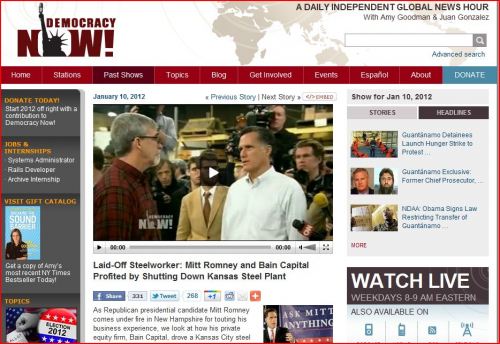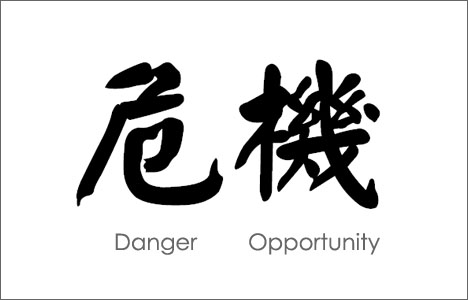
It’s one thing for the hometown paper to get scooped on a huge story like AMC Entertainment selling out to the Chinese…
Quite another to pull up short on its front page followup. Unfortunately, that’s exactly what happened earlier this week when the Star rolled out its version of the New York Times scoop on AMC being in talks to sell the company "or a significant stake" to China’s Wanda Group.
How serious is Wanda? Apparently very.
"The Chinese group has reportedly been eyeing an acquisition since president Wang Jianlin said in a speech at Tsinghua University in Beijing in 2011 that his company would ‘shock the world’ with an acquisition to be made within the year," the news organization Want China Times reported yesterday.
Now a little much-needed background and perspective.
Having laid off the business reporter that covered AMC four years back, the Star was forced to play news catchup by drafting into service reporters from its real estate and "human resources" beats. The net result begetting largely a rehash of old news with a couple quotes thrown in from a local AMC business associate rather than an independent third party.
"I was curious about that myself," says one local movie insider. "Why were they asking that guy? It just seemed kind of incestuous."
Also missing in the Star coverage were specifics, perspective and questions regarding the how and why of AMC having "gone private" years ao and subsequently being unable to cash back in via public stock offerings in three attempts. The most recent coming last month and leading up to the potential Chinese sale news.
So let’s take a look, starting with AMC’s going private in 2004.
"Private equity firms are notorious for taking public companies private only to sell shares to the public again down the road," explains B. Simmons of Investing Answers. "Private equity groups generally use leveraged buyouts or buyouts financed by large debt levels to fund their acquisitions, but the result is the same: The shares that are currently public will go away."
Later to return, hopefully generating enormous profits.
 It may be worth noting that Bain Capital – Mitt Romney‘s old firm that shuttered a more than 100 year-old Kansas City steel mill and laid off more than 700 workers in the early 2000s – is one of AMC’s private equity partners.
It may be worth noting that Bain Capital – Mitt Romney‘s old firm that shuttered a more than 100 year-old Kansas City steel mill and laid off more than 700 workers in the early 2000s – is one of AMC’s private equity partners.
In short, the practice of going private, restructuring the company and then taking it public again is often a means of cashing in and/or out on the private equity partners’ investments?
"You’re basically correct," says one close follower of AMC’s business dealings. "They took the company private and they’ve been looking for an exit strategy for the last five years."
When AMC’s owners first tried to cash back out in 2007 via a $500 million stock offering, they were heading into the current recession and the timing couldn’t have been worse. But even then there was more to that story.
"We have a significant amount of debt," AMC’s offering at the time read. "We have had significant financial losses in recent years. Prior to fiscal 2007, we had reported net losses in each of the last nine fiscal years totally approximately $512 million."
So while the Star‘s AMC-friendly business associate largely placed the blame for the company’s triple failure to take the company public again on market conditions, there appears to be far more to the story.
"The problem is all of the money they’ve been trying to rasie goes to the investors and not to invest back into the company," says the AMC watcher. "It’s a legitimate deal, it’s just not particularly appealing to investors."
In a perfect world taking a company public would raise money to position it for growth rather than to merely "retire debt."
 A number of other significant details went missing from the local account of AMC’s foray into China.
A number of other significant details went missing from the local account of AMC’s foray into China.
For example, "The last few years have been extremely difficult for theater operators. Last year, attendance in North America fell to 1.28 billion, a 4 percent decline from 2010 and the lowest total in 16 years," the New York Times story reported. "Ticket revenue for last year totaled $10.2 billion, a 3 percent decrease."
And aside from market conditions "not being right," AMC may have pulled the plug on its IPO to focus on China "to allow the three firms to recoup an investment they made when they bought the company AMC in 2004," the LA Times reports.
The Los Angeles newspaper cited other difficulties facing AMC in another story late last month.
"It’s a tough business,” one of the paper’s sources was quoted, "citing the long-term challenges faced by the exhibition industry, especially from the threat posed by shrinking theatrical windows — the period between when a movie is released in theaters and when it can be viewed in the home."
"The biggest issue (AMC’s) facing is how to navigate the collapsing of theatrical windows," the source told the Times.
So while the movie biz is up sharply this year and headed into what hopes to be a boffo summer, there’s far more to the AMC China story than reported locally. Until now, of course.










China is still in the midst of a credit bubble so Wanda may be able to get enough government loans to pull this off. If the private equity guys think hey can get a better payout that way than with an IPOD they’ll take Wanda’s money and run.
Sushi or Shouldn’t She
If the chi-coms take over you bet your sweet ass that every credit card swipe will be used to obtain account info that will be sent back to credit hackers in Beijing. And as I stated previously, with all new movies being digital this will allow the chi-coms to make higher quality pirates that will hit the streets the day after the movie opens. Great exit strategy for AMC and the vultures, bad, bad, deal for the movie industry. I would hope that if this deal goes through that Americans will boycott AMC. Stan Durwood has got to be red-lining in his grave.
Now if Wanda would also agree to buy the Royals and pump 100 million a year into payroll I might rethink my opposition.
smartman
Call me.
smartman, I hope that’s tongue in cheek about the CC swipes. If not, it makes you sound a little loco en la cabeza (that’s illegal alien for nuckin futz).
Movie theaters are dinosaurs anyway. They are going to have to make serious changes in the business model (you get a non transferable digital copy with a ticket, better concessions, family all you can eat passes, etc…).
It just seems like it is too capital intensive (millions every decade to update sound and screen) to essentially just run a concession stand that you get 10% from the tickets. I went to see the Avengers. Two tickets were $10, and a large popcorn and large soda were 13.25. So Disney (who owns marvel) got $9 from me (they get 90% of all first week movies), and AMC got $14.25, minus whatever costs to operate the screen and pop the corn.
That’s Ok, but it isn’t ridiculous money on one customer. And there weren’t a lot of people buying themselves large cokes and bigass popcorns.
Business model must change or dinosaurs will die.
relevant
http://www.youtube.com/watch?v=_Ahc-oEFQ7k
Part Time Steve Jobs
Hey Balboni. I am fucking nuts! Steve Jobs said good artists borrow, great artists steal. The chi-coms business model exists around stealing. Chinks will have every piece of digital audio and visual technology in the theater cloned within months, hurting US manufacturers of said equipment. I’m dead ass serious about the credit card swipes. The Chinese hate us more than the towelheads. They just disguise it better. But we also unload debt on them that we will probably default on. In the end I think we just give them California and call it even. If anybody can get that state back on track it’s the chi-coms. When you erase all the debt that the big movie chains have rung up and work with a clean slate it can be a great business. The studios can’t afford the exhibitors going out of business. They will adjust the splits as necessary to keep that industry healthy. Typically, the splits change the longer the film is in theater. So after 4 or 6 weeks it may be 60/40 vs 90/10. I’m into the whole keep your friends close and your enemies closer thing but letting the chi-coms buy AMERICAN MULTI CINEMA is too close for me.
Between Hearne straddling the fence trying to decide if he wanted this to be another slam on the Star or an actual news piece informing readers on a potential Chinese AMC acquisition…and Smartman quoting Steve Jobs and mis-using the reference, this has been a very entertaining read. Well done gentlemen. Excellent use of the internet.
Hearne couldn’t resist
Throwing a jab at Mitt Romney’s “old company” and posting a picture of another liberal site. My family has a looong history with Armco Steel. My mother, step-father, and brother all worked there, in administration, senior management, and a mill worker, for 19, 38, 5 years respectively. They all agree and to be factual, the reason the steel mill was closed was because of the Japanese steel imports at that time. The U S steel industry was crushed by the imports and the lack of concessions by the union workers and their leaders.
Bain Capital helped financed KC Works(formerly Armco Steel) when they were in deep financial trouble. The financial trouble continued because KC Works could not compete with imports, and union salaries while using outdated equipment.
Your stacked, insufficient, and oversimplified evidence along with your figurative analogies do not work on me and many others. Your fallacy of guilt by association is troubling and quite unprofessional.
Get your facts straight Hearne!
When you inject your liberal slant into a non-political story your credibility diminishes.
This does not help you establish ethos.
Careful reader advisory…
Hey, all I did was mention that Bain was in the AMC brain trust. Don’t be so thin-skinned!
Hearne – OH THAT’S ALL
No, you mentioned Mitt Romney’s “old company” and put a picture of him up too so as to show guilt by association. You can’t brush it off that easy, not on me anyway. The picture, the oversimplified evidence. So non sequitur.
Very amateurish Hearne.
Amateurish, huh?
You don’t like the 2 plus 2?
You don’t think it’s worth mentioning that Bain is involved in an AMC deal where the company is in trouble and the investors – including Bain – are trying in vain to recoup their losses through a series of failed IPOs and now appear to be trying to do so by selling out to China?
Methinks the skin is thin.
Hearne – Answer up!
You’ve lost credibility with this article. It is poor reporting. Stop before you lose any more credibility, really. I absolutely have no thin skin, nor do I have an allegiance to Mitt Romney, I just absolutely despise poor reporting.
Sure, mention Bain Capital if it is in fact true, but why inject your political slant in a non-political story and why mention Mitt Romney when he is not even involved with the business transaction? It is fallacious at best!
You have not addressed or defended neither your stacked and oversimplified evidence nor the posting of the picture that has no merit to the story. Before you start making accusations about a company or person, you should gather your own facts; to do any less is unethical.
You might have had good intentions with this story in the beginning, but you just couldn’t resist the temptation to ink it up with your distorted emotional appeal.
We expect better reporting from you Hearne, and frankly, you should too.
Suit yourself…
I’m a columnist who at times mixes straight reporting with opinion. Or opinion backed by reporting. You may want to take that into consideration.
If you do not think that it’s interesting that a local firm is going through some difficult times while dealing with firms that many Republican presidential candidates labeled “vulture capitalism” you’re free to see things that way.
My bet is that many – if not most people – will find that detail interesting, as did I, so I included it.
That out of all of the reporting and analysis here you continue to harp on that tiny detail says more about you than anything else I would suggest. So scold away if that’s what suits you. The purpose of this story was not to leave things out, the Star already played that card.